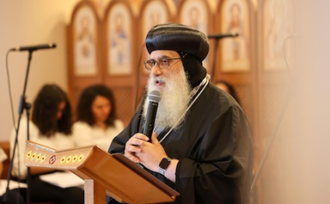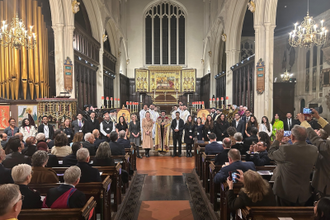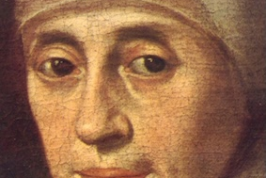Coptic Bishop: Christian unity requires humility, dialogue, and love

Photo:Marcelo Schneider/WCC
Source: WCC
His Eminence Bishop Abraham, from the Coptic Orthodox Church, took time to reflect on the role of his church in the ecumenical movement, and his vision for Christian unity today.
"I believe Christian unity must develop along two main paths: cooperation and dialogue," he said. "The first path is cooperation - meeting, talking, and working together."
He noted that many churches, specially newer ones, are not well-acquainted with the heritage of others, particularly that of the Orthodox tradition. Within the World Council of Churches, Orthodox churches represent about 25% of the membership.
"People often recognize us by our vestments or our liturgy, but they may not truly understand our theology or spiritual life," said Bishop Abraham. "Through cooperation - visiting one another, studying together, and building relationships - we can foster understanding and mutual respect."
Deep conversation
The second path named by Bishop Abraham is dialogue, specifically deep theological conversation. "Since the 1980s and 1990s, the Coptic Church has been engaged in dialogues with Anglican and Reformed churches, as well as with other Orthodox families," he explained.
"These efforts help us identify what we share in faith and clarify where we differ, as we did with the Christological agreement of 1989."
Bishop Abraham believes that, if churches succeed in combining cooperation and dialogue, they will build not just symbolic fellowship, but real, theological unity.
"We have to go back to the roots," he suggested. "The Orthodox Church is deeply traditional - grounded in Scripture, theology, and the life of the church. The rites and traditions are not mere customs; they carry spiritual and doctrinal meaning."
The Coptic Church is one of the Apostolic Churches, founded by St Mark the Apostle, who came to Alexandria around 60 AD and preached the Gospel there. This makes the Coptic Orthodox the native Christians of Egypt - long before the arrival of Islam in the 7th century.
"Our apostolic succession has remained unbroken - from St Mark to our current Patriarch, the 118th successor," said Bishop Abraham. "This continuity is a living witness to our faith and tradition. Such an unbroken legacy can enrich the ecumenical dialogue. It reminds us that visible unity is not only about agreeing on a creed, but about understanding what that creed means in practice."
When we discuss doctrines like baptism, the Trinity, or the nature of Christ, Bishop Abraham believes we must ask, "What does this mean to you? What does it mean to us? True unity begins when we sit together and explore these questions deeply, guided by the fathers of the church."
The Coptic Church participates in ecumenical circles in many ways, Bishop Abraham said. "We are actively engaged in dialogue," he said. "The Coptic Church maintains ongoing conversations with the Catholic Church, the Anglican Communion, and others."
These efforts are aimed at greater mutual understanding and, ultimately, visible unity.
"Our first step is to strengthen unity among the Orthodox churches themselves - and from that foundation, we can build bridges to other Christian families," said Bishop Abraham. "Our participation in ecumenical organizations - whether the WCC, the Middle East Council of Churches, or the African Council of Churches - is an essential part of our witness."
Bishop Abraham believes ecumenical platforms allow the Coptic Church to introduce themselves to others, to make the Coptic Orthodox Church known and understood, and will also give the church a platform to express its faith clearly. "Sometimes, we encounter issues in which we must say, 'We cannot agree,' and explain why," he said. "This is not confrontation - it is witness."
When people question participation in ecumenical circles, Bishop Abraham believes it's important to explain that being present is a form of testimony. "When we speak about our beliefs, our traditions, and our theology, others come to know who we truly are," he said. "Our message is simple and timeless: Go back to the roots."
At the time of the First Council of Nicaea, all churches were united - one body of faith.
"Divisions came later through heresies and misunderstandings," said Bishop Abraham. "To move toward visible unity today, we must recover that same spirit - a spirit of humility, dialogue, and love. We must learn to respect and accept one another, even when we differ."
If we continue to see others as wrong and ourselves as right, Bishop Abraham believes unity will remain out of reach. "But if we look together to the fathers and to the apostolic foundations of the faith, we will find the path toward true communion," he said. "The message we bring is this: Return to the roots, to the fathers, and to the authentic faith - and let that guide our journey toward unity."


















